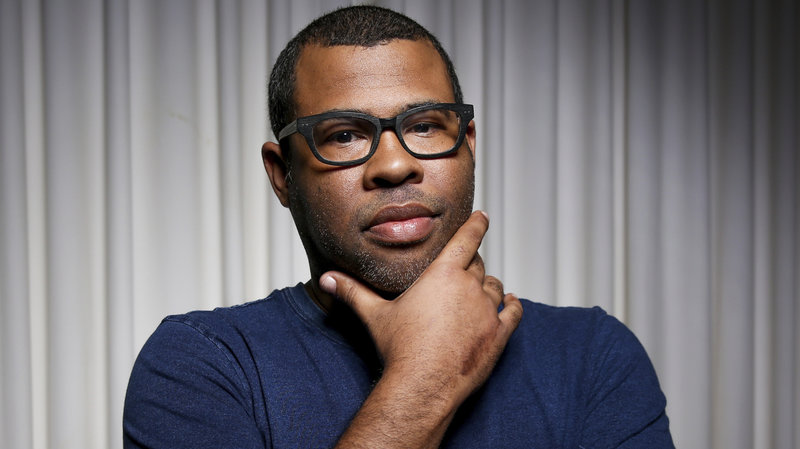Jordan Peele: Revolutionizing Hollywood’s Movie Industry
April 29, 2019
If you haven’t already seen Jordan Peele’s Get Out, you are sorely missing out on what I consider one of the greatest movies of the past ten years. What I, and so many others, admire in this movie is the unapologetic commentary on white liberal racism in America. Peele is one of few directors that has taken the stereotypically fantastical horror genre and given it a real-life perspective on racism in America.
BEFORE READING MORE: SPOILERS AHEAD FOR GET OUT AND US
Hollywood has a tendency of reusing old ideas, sticking to ‘safe’ actors of predominantly the white race, and avoiding ‘controversial’ content like LGBT or minority representation. Peele, on the other hand, opened his directing debut with a bang and destroyed most, if not all, of these conventions.
The basic plot of his debut Get Out shows Chris (Daniel Kaluuya), a black man, going to his girlfriend, Rose’s (Allison Williams), house to meet her family. There, he finds himself feeling on edge around her parents, brother, and their multitude of white friends, who take a sudden interest in his physicality and love to point out their acceptance and love for black people. Long story short, Chris is kidnapped by the family, who try to cut out his brain and put it in one of their white friends because they want some aspects of his black identity but not him, as a black man. Again, if you haven’t seen this movie, you’re missing out on one of the greatest pieces of cinema, and you’re probably very confused.
Get Out quickly became one of the most popular movies of 2017 because it tackled microaggressions and stereotypes against black people, as well as liberal racism. Liberal racism is racism perpetuated by progressive whites who are unknowingly being racist. An example of this in the movie is when a white character mentions how Chris being black was ‘cool’ or ‘in’ right now. Or when every white person in the room made it a point to comment on Chris’ physicality and body while simultaneously ignoring any opportunity to really get to know ‘Chris, the person’ and not ‘Chris, the black man’.
To say the audiences watching were surprised and transfixed by the movie would be an understatement. On its own, the brain transplant plot-point is insane. Add the commentary about liberal racism to it, and you have audiences with their jaws on the floor. This was one of the first movies that advertised itself as horror but turned out to lack any typical horror movie conventions. Yes, it had the brain transplant and a few jump scares, but what it really was commenting on was the horror of racism by progressive whites. Peele made it a point to highlight liberal racism in America, knowing that society often chooses to ignore it because it is perpetuated by the so called, ‘good guys.’
Peele set in motion a ‘call to action.’ He explicitly told all directors and filmmakers to integrate social commentary and controversial topics into their movies. During a talk with over 200 improv students at East Hollywood’s Upright Citizens Brigade Theatre, Peele said, “I don’t see myself casting a white dude as the lead in my movie… I’ve seen that movie.” Now the question remains: why aren’t more filmmakers realizing that taking a stance on controversial and important topics is not going to break their movies, but instead increase its viewership and overall rating? Get Out made over 255 million dollars total and over 33 million in its opening weekend alone and is rated 98% on Rotten Tomatoes. If this doesn’t show how successful a movie with important topics can be, I don’t know what can.
Recently, Peele’s new film Us came out and enthralled audiences all around America. Us centers around an African American family who goes on a vacation and suddenly gets attacked by people that look exactly like them. Doppelgangers. Long story short, and in an attempt to avoid large spoilers, Peele inserts social messages about social class as well as the monster in oneself. Peele did exactly what he did with Get Out: taught his audience a lesson about life and effectively made a popular movie. When I saw the movie, I was transfixed with how Peele could turn a terrifying movie into one that taught me a lesson about life.
Peele crafts Get Out and Us as the perfect combination between an entertaining and socially terrifying experience. In Get Out, Peele wanted liberal whites to look at themselves and say, ‘Is this true?’ and ‘How do we change?’ His call to action is exactly what the film industry is missing in so many of its movies. It’s about time directors realized this and tried to fix it.
- http://www.mtv.com/news/3107889/jordan-peele-us-everything-we-know/
- https://www.complex.com/pop-culture/2019/02/everything-we-need-to-know-about-us/
- https://www.theguardian.com/film/2017/feb/28/get-out-box-office-jordan-peele






